4:30 pm start time
DISTRICT MEETING SCHEDULE
October 14 - District 10 Director: Mike Duguid Arborg-Bifrost Community Centre (Arborg)
October 15 - District 4 Director: Byron Falk New Horizon Senior Centre (Grunthal)
October 21 - District 2 Director: Mark Schram Floyd & Ethel Cudmore Hall (Crystal City)
October 23 - District 8 Director: Matthew Atkinson Neepawa Legion
October 27 - District 12 Director: Mark Good Ste. Rose du Lac Community Hall
October 28 - District 14 Director: Dale Cazakoff Swan River Elks Hall
November 3 - District 6 Director: Brian English Oak Lake Community Hall
November 4 - All Districts VIRTUAL MEETING - 7:00 pm
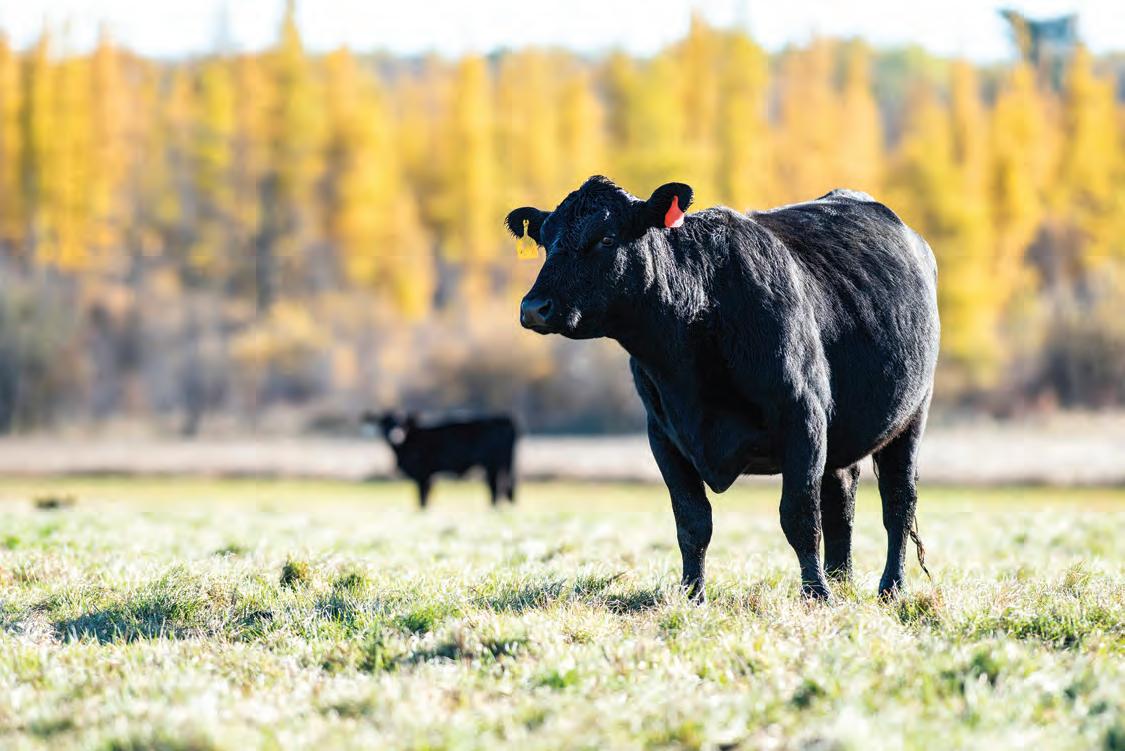
Click here to register!
In this edition...
September 12, 2025

Reminder
Applications for consideration for The Environmental Stewardship Award due to MBP by December 12. All beef cattle operations in Canada are eligible to apply for consideration for TESA. Interested producers can either nominate themselves, or be nominated by another individual or an organization. More details and the application form can be found by clicking the graphic.
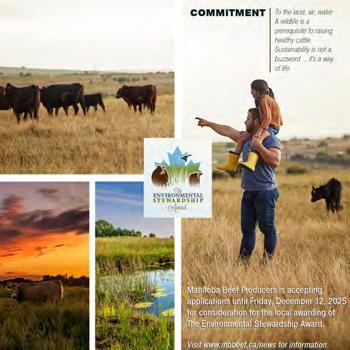




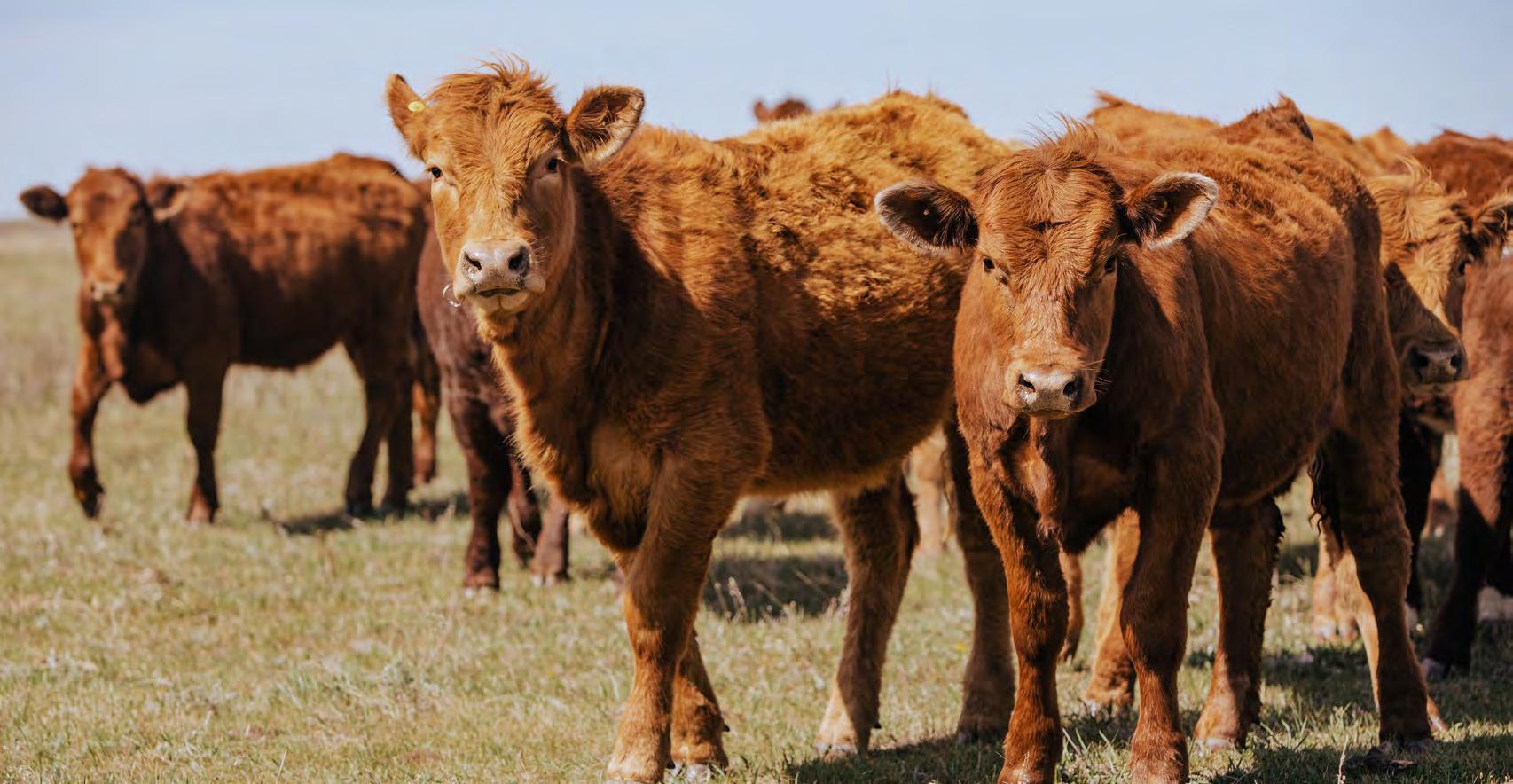
Discover Agriculture on the Farm and Seize the Season!
(September 11, 2025 media release) Urban and rural Manitobans are invited to explore farming and food production at the popular “Discover Agriculture on the Farm” open house on Sunday, September 14, kicking off Farm and Food Awareness Week in Manitoba. Visitors can engage in conversations with local Manitoba farmers, take a wagon ride to visit pigs, dairy cows, broiler chickens, and laying hens, and explore crops grown on the Prairies.
The free event will run from 10 a.m. to 2 p.m. at the Bruce D. Campbell Farm and Food Discovery Centre, just 15 minutes south of Winnipeg on Highway 75.
Hands-on activities include crushing canola to make oil, guessing the identity of different seeds, and matching farm goods to products found in everyday life. Visitors young and old can also try their hand at the Guardians of the Grasslands grazing simulation, egg trivia, the Oinko! disc drop, and the Wheel of Chicken trivia game.
Participating organizations – including MBPwill be sharing recipe cards and booklets, along with a variety of free giveaways, including colouring/activity books, crayons, temporary tattoos, water bottle stickers, reusable shopping bags, and more.
Free food samples featuring Manitoba products will be served (while supplies last) including pulled chicken and pork sliders, cookies made from eggs and canola, milk, beef charcuterie, bison meatballs, and freeze-dried berries.
This year marks the 11th annual Farm and Food Awareness Week (September 14–19, 2025) across Manitoba and the 2025 theme, Seize the Season: Appreciating Manitoba’s Harvest, invites Manitobans to make the most of the Fall season, by enjoying local seasonal foods, taking part in harvest activities and visiting markets and farms, like the Farm and Food Discovery Centre.
“Discover Agriculture on the Farm” offers visitors a unique opportunity to visit a working farm and build out their fall harvest bucket list while learning more about the diversity of food production in Manitoba and the importance of agriculture to our provincial economy.
Manitoba’s agriculture and agri-food sector generates $18.3 billion in direct output and employs over 34,000 people essentially one in 22 jobs in the province.
For more information: Crystal Jorgenson, University of Manitoba 204-791-8109 crystal.jorgenson@umanitoba.ca



Province Advises of Bridge Closure
Bridge Over Morris River on PTH 3 Now Closed to Traffic
(September 10, 2025 Province of Manitoba News Release) Manitoba Transportation and Infrastructure has closed the bridge over the Morris River on Provincial Trunk Highway (PTH) 3 near Brunkild until further notice.
Due to structural instability, an emergency closure is in place to ensure the safety of travellers. Both westbound and eastbound lanes on PTH 3 are closed to traffic, with a detour in place directing traffic to PTH 13 and PTH 2. Plans are underway to replace the structure.
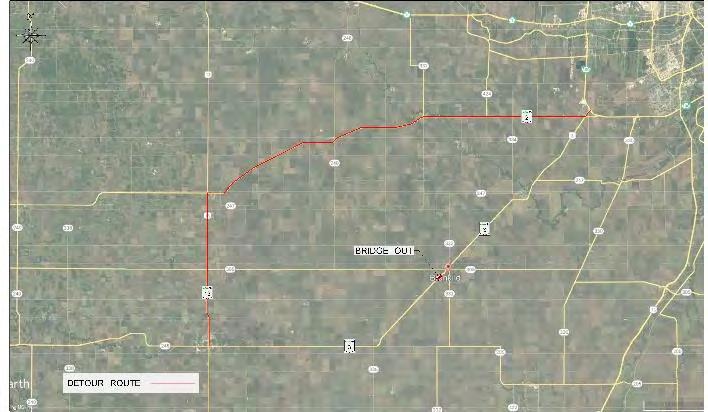
Up-to-date information on highway conditions, including detours, restrictions and road closures, is available at www.manitoba511.ca/ or by calling 511.


CCA Announces National Environmental Stewardship Award Recipient from New Brunswick
September 10, 2025
Levis, Quebec — The Canadian Cattle Association (CCA) is pleased to announce Don and Geraldine Bettle, Passekeag Holdings Inc, located near Passekeag, New Brunswick as the recipient of The Environmental Stewardship Award (TESA) for 2025.
Don and Geraldine Bettle have been farming for nearly 50 years at Passekeag. Together, they run Passekeag Holdings Inc., a 70-head Angus-based cow herd on a land base next to the Kennebecasis River. Since Don’s youth, the river has been a vital part of the farm, inspiring his dedication to protecting the water, riparian areas, and wildlife habitat.
The Bettles use a paddock rotational grazing system to promote forage regrowth and soil health, along with soil testing, lime application, and winter bale grazing to improve marginal land. In response to changing climate patterns, they’ve adapted forage species and grazing timing.
The Bettles have set aside 300 acres of wetland in collaboration with Ducks Unlimited and the Kennebecasis Watershed Restoration Committee to promote conservation. Waterfowl have been encouraged with the installation of duck nesting boxes. The protection of natural habitats helps to support hawks, swallows, beavers, otters, mink, and various fish species. Wildlife corridors have naturally developed through land clearings between wooded areas, allowing animals to move safely while reducing pressure on fencing and encouraging habitat continuity.
To learn more about the Bettles and their operation, visit https://cancattle.wixsite.com/cattle/post/2025-tesa-nominee-profile-maritimes-don-andgeraldine-bettle
The award was presented in-person by Mike Duguid, Co-Chair of CCA’s Environment Committee and Lisa Miller, Partner, with MNP at the banquet during CCA’s semi-annual meeting Passekeag Holdings Inc was one of seven regional nominees from across Canada vying to be named the national recipient
“The Bettles show incredible respect for the land and environment and demonstrate every day how Canadian beef producers support grasslands and protect homes for birds, wildlife, pollinators and fish,” said Duguid “We had seven very worthy nominees who show outstanding leadership and dedication to environmental stewardship and sustainable farming practices. We congratulate and celebrate all of their practices and efforts.”
CCA thanks our Platinum Sponsor MNP, and our Foundational Partners, Ducks Unlimited Canada, Birds Canada, and the Canadian Roundtable for Sustainable Beef (CRSB), for supporting this year’s TESA program. CCA would also like to recognize the contributions of our judging committee, Karli Reimer with Ducks Unlimited Canada; Brad Downey with the Alberta Conservation Association; Ian Cook with Birds Canada; Norine Ambrose with Cows & Fish; Monica Hadarits with the Canadian Roundtable for Sustainable Beef; John and Maria Duynisveld, the 2024 TESA recipients from Nova Scotia; and Lynn Grant, CCA Environment Committee Co-Chair.
The Canadian Cattle Association is the national voice for Canada’s beef cattle industry representing 60,000 beef farms and feedlots www.cattle.ca

About the Regional Nominees
News Release
British Columbia — Barnett Land and Livestock: Duncan and Jane Barnett of Barnett Land and Cattle along the Cariboo Gold Rush Trail were nominated in recognition of their innovative efforts in ecosystem protection, water conservation, and rotational grazing. Their operation also prioritizes fire and forest management, collaborates with University of British Columbia on research, and has seen a positive return of wildlife due to their sustainable practices.
Learn more at https://cancattle.wixsite.com/cattle/post/2025-tesa-nominee-profile-bc-duncanand-jane-barnett-barnett-land-livestock
Alberta — Plateau Cattle Co: Laura Laing and John Smith of Plateau Cattle Co near Nanton were nominated for their commitment to sustainable ranching, animal welfare, and innovative herd health practices. Their operation combines environmental advocacy, community involvement, and science-based cattle management to enhance both land and livestock while supporting education and wildlife conservation.
Learn more at https://cancattle.wixsite.com/cattle/post/2025-tesa-nominee-profile-alberta-johnsmith-and-laura-laing-plateau-cattle-co
Saskatchewan — Elford Ranch: Mark and Karin Elford of Elford Ranch near Killdeer were nominated for their dedication to preserving native grasslands and practicing thoughtful, sitespecific grazing management. With a philosophy of giving more than they take, the Elfords focus on sustainable ranching while actively contributing to the cattle industry and leading by example within their community.
Learn more at https://cancattle.wixsite.com/cattle/post/2025-tesa-nominee-profilesaskatchewan-mark-and-karin-elford-elford-ranch
Manitoba — Breault Ranching Ltd: Clayton and Shauna Breault of Breault Ranching Ltd. near Ste. Rose were nominated in recognition of their commitment to regenerative agriculture and sustainable land management across 22,000 acres. By adopting zero-till practices, eliminating synthetic fertilizers, implementing rotational grazing, and adjusting calving dates, they have significantly improved soil health, reduced animal treatments, and increased organic matter, all while actively engaging with sustainability-focused organizations.
Learn more at https://cancattle.wixsite.com/cattle/post/2025-tesa-nominee-profile-manitobaclayton-and-shauna-breault-and-family
Ontario — Van Osch Farms Ltd: Van Osch Farms in Middlesex County, operated by the Van Osch family, combines large-scale cattle and crop production with sustainable practices, earning certifications from the Canadian Roundtable for Sustainable Beef and Ontario Corn Fed Beef Quality Assurance Program. Through innovations like solar energy, regenerative crop management, upcycling cattle feed, and data-driven technologies, the farm continues to improve soil health, animal welfare, and environmental impact.
Learn more at https://cancattle.wixsite.com/cattle/post/2025-tesa-nominee-profile-ontario-vanosch-farms-ltd
Quebec — A l’Herbe: First-generation farmers Frédéric Lebel and Dominique Dumas of A l’Herbe, a grass-finished beef farm west of Quebec City, transformed former crop land into diverse forage pastures, built community through a local butchery co-op, and contributed to research on carbon sequestration through the Racines d’avenir Living Lab project. They take a regenerative approach to soil health and intensive rotational grazing of 122 Angus-Simmental
The Canadian Cattle Association is the national voice for Canada’s beef cattle industry representing 60,000 beef farms and feedlots www.cattle.ca

cross steers.
News Release
Learn more at https://cancattle.wixsite.com/cattle/post/2025-tesa-nominee-profile-quebecfrederic-lebel-and-dominique-dumas-a-l-herbe
About TESA
Since 1996, TESA has recognized producers who go above and beyond standard industry conservation practices and set positive examples for other cattle producers and the general public. At the local level, a producer receives provincial recognition for their outstanding contributions. These recipients move forward as nominees for national recognition from the CCA. The national TESA recipient is announced during the CCA semi-annual meeting. CCA will celebrate the 30th anniversary of the TESA program in 2026.
For further information, contact: Tina Zakowsky, Communications Manager Canadian Cattle Association 403-451-0931| zakowskyt@cattle.ca
The Canadian Cattle Association is the national voice for Canada’s beef cattle industry representing 60,000 beef farms and feedlots www.cattle.ca

2025 Reg Schellenberg Next Generation Legacy Award Recipient Announced
September 10, 2025
Levis, QC—The Canadian Cattle Foundation (the Foundation) presented the annual Reg Schellenberg Next Generation Legacy Award to Brianna Elliot of Sundre, Alberta, to support the Canadian Cattle Young Leaders (CYL) Program Vice President of the Foundation Lynn Grant and CCA Past President, Nathan Phinney presented the award at the Canadian Cattle Association’s (CCA) Semi-Annual Meeting Banquet.
In December 2022, Reg Schellenberg, President of the Canadian Cattle Association, suddenly passed away. In lieu of flowers, the Schellenberg family requested that donations be made through the Canadian Cattle Foundation to support the Canadian CYL Program.
The Reg Schellenberg Next Generation Legacy Award recognizes individuals who exemplify the values Reg Schellenberg was known for—humble leadership, a commitment to mentorship, a spirit of collaboration, and unwavering dedication to the Canadian cattle industry.
CYLs were encouraged to nominate one of their peers for the award based on criteria built with the Schellenberg family, including but not limited to being a positive, humble leader with the ability to bring people together to achieve a common goal, and being an overall exceptional ambassador of the Canadian beef industry. Interviews were conducted with the top nominees to select this year’s recipient.
“Reg had a deep belief in the power of mentorship and was dedicated to helping the next generation succeed—his leadership left a lasting mark on us all,” said Bob Lowe, Chair of the Foundation.
“It means so much to our family that Reg’s passion for the next generation and the cattle industry is being recognized in this way. Thank you to the Canadian Cattle Foundation and the Canadian Cattle Young Leaders Program for helping keep his legacy alive,” said Shannon Schellenberg, Reg’s wife.
Through this fund, each year a CYL graduate is selected to receive the Reg Schellenberg Next Generation Legacy Award. To recognize the exceptional qualities and contributions of the nominee, the judging committee selects an outstanding young leader who embodies the same dedication and leadership for the Canadian beef sector that Reg displayed. The award includes a travel bursary to attend the 2025 Saskatchewan Beef Industry Conference along with a belt buckle donated by the Schellenberg family ranch, Perrin Ranching 1996 Ltd.
If you would like to contribute to the Reg Schellenberg Next Generation Legacy Award or if you are interested in partnering with the Canadian Cattle Foundation to invest in the next generation of the Canadian beef industry, please contact foundation@cattle.ca
For further information, contact: Tina Zakowsky
Communications Manager, Canadian Cattle Association 403-451-0931 | zakowskyt@cattle.ca
The Canadian Cattle Association is the national voice for Canada’s beef cattle industry representing 60,000 beef farms and feedlots www.cattle.ca
Federal, Provincial and Territorial Ministers of Agriculture meet to support a resilient and competitive agriculture and agri-food sector
(September 9, 2025 Agriculture and Agri-Food Canada News Release) The annual conference of federal, provincial and territorial (FPT) Ministers of Agriculture was held in Winnipeg, Manitoba, from September 7 to 9, 2025. Ministers recognized the impacts of dry conditions and wildfire activity affecting regions across Canada, and the significant uncertainty caused by tariffs.
FPT Ministers met to advance collaborative efforts in support of a resilient, sustainable and competitive agriculture sector and affirmed their commitment to working together to support hardworking producers and processors to address a variety of existing and emerging challenges. Ministers highlighted ongoing engagement activities across governments, industry and with key sector partners and acknowledged the recently imposed tariffs’ impacts on the sector and the economy. Trade action on Canadian canola, peas, pork, and seafood and other commodities has significant financial and economic implications for the agriculture and agri-food industry. To support the sector’s ability to navigate evolving trade dynamics, Ministers emphasized the importance of ongoing engagement with key trading partners, including the United States and China, while expanding and diversifying market access and enhancing critical infrastructure. Ministers also heard from a panel of experts, composed of producers, processors, food manufacturers and others from across the agriculture and agri-food value chain on future trade opportunities, infrastructure and other investments. Ministers discussed the conditions of competition between domestic and imported agriculture and agri-food products, and agreed to examine the issue in further detail.
Throughout the conference, discussions focused on ensuring that Business Risk Management (BRM) programs are sustainable and reflect the needs of producers. Ministers reviewed recent adjustments to the AgriStability program for the 2025
program year, including increases to both the compensation rate and the maximum payment limit. Ministers confirmed their intention to implement the necessary adjustments to include feed costs associated with rented pasture as an allowable expense starting in the 2026 program year, while exploring the possibility of adding further allowable expenses to improve program effectiveness. In their discussions on the next policy framework, Ministers explored opportunities for potential reforms to the BRM suite and tasked officials with continuing to assess and develop options that ensure programs are more coherent and responsive.
FPT Ministers discussed their commitment to preserving the Safe Food for Canadians Regulations as the basis for interprovincial and territorial trade of food in Canada, while continuing joint efforts on the slaughter availability pilot projects and pursuing a number of other opportunities to further facilitate internal trade. Seizing these opportunities will help ensure food safety while protecting continued access for Canadian businesses to critical export markets.
Ministers reaffirmed commitments to take collaborative action on key initiatives related to animal disease preparedness, prevention and response activities. Ministers highlighted progress with governments and industry, including on preparedness activities related to African swine fever, a Foot-and-Mouth Disease (FMD) vaccine bank for Canada, and work to reduce the impact of highly pathogenic avian influenza (HPAI). Ministers also underscored the importance of biosecurity to safeguard animal health and the sector’s resilience.
Ministers heard a presentation from the Pest Management Regulatory Agency (PMRA). They highlighted the importance of a science and evidence-based regulatory system that is predictable, reliable, economic-minded and timely. Ministers discussed the need to enhance
Federal, Provincial and Territorial Ministers of Agriculture meet to support a resilient and competitive agriculture
collaboration and consultation among governments to improve the efficiency of the pesticide regulation system, investment in research to promote innovative pest management and preventative tools.
Ministers welcomed recent progress on reducing red tape, regulatory modernization efforts and improving service delivery for regulated parties. Initiatives include a streamlined pathway for the approval of feed products, and the launch of a centralized website to simplify licencing. Ministers supported continued work to pursue harmonization of Canada’s Bovine Spongiform Encephalopathy (BSE) enhanced feed ban with the U.S. to improve competitiveness for producers and processors. These efforts support regulatory modernization, economic growth, and better outcomes for producers and consumers across Canada. Ministers discussed the importance of addressing food waste.
The next Annual FPT Ministers’ meeting will be held in Halifax, Nova Scotia. For more information, please see the Backgrounder: Summary of items from the 2025 Annual Meeting of Federal Provincial and Territorial (FPT) Ministers of Agriculture.
Quotes
“From coast to coast to coast, we want to see our producers seize new opportunities, reduce regulatory barriers, expand market access, and drive solid economic growth for the sector as a whole. By working together, we will help ensure producers have the tools they need to succeed, while strengthening the resilience and competitiveness of the sector for years to come.”
- The Honourable Heath MacDonald, federal Minister of Agriculture and Agri-Food
“The Manitoba government recognizes farmers and the critical job they do. It was our pleasure to welcome provincial and territorial ministers to share producers’ concerns with the federal Minister of Agriculture. During times of uncertainty, we are
and agri-food sector
committed to working with federal, provincial and territorial partners, as well as with industry, to keep agriculture strong. Our focus remains on long-term economic stability, while continuing to advocate for initiatives that help producers navigate global market and trade pressures.”
- The Honourable Ron Kostyshyn, Manitoba Minister of Agriculture
Quick facts
• In 2024, Canada’s agriculture and agri-food system generated $149.2 billion, representing about 7% of Canada’s gross domestic product (GDP), and provided 1 in 9 jobs in Canada.
• Canada’s global exports of agriculture and agri-food in 2024 overall were $92.2 billion in 2024, compared to $91.6 billion in 2023.
• In 2024, Canada exported nearly $100.3 billion globally in agri-food, fish and seafood products combined. In 2023, that number was $99.2 billion.
• The Sustainable Canadian Agricultural Partnership is a 5-year, $3.5billion investment between federal, provincial and territorial governments. This includes $1 billion in federal programs and $2.5 billion in cost-shared programs and activities that are cost-shared at 60% federally and 40% provincially/territorially for programs that are designed and delivered by provinces and territories.
Associated links
• Business risk management programs
• Sustainable Canadian Agricultural Partnership
• Federal, Provincial and Territorial Ministers of Agriculture meet to help strengthen the resilience and competitiveness of the sector
Federal, Provincial and Territorial Ministers of Agriculture meet to support a resilient and competitive agriculture and agri-food sector
Backgrounder: Summary of items from the 2025 Annual Meeting of FPT Ministers of Agriculture
Business Risk Management
Ministers were updated on the full range of activity by FPT officials related to the implementation of Business Risk Management (BRM) programs under Sustainable Canadian Agricultural Partnership, including recent adjustments agreed to at their meeting in July. They also had a forward-looking discussion on examining the entire BRM suite as part of the Next Policy Framework negotiations. Discussions included the consideration of further work on AgriStability allowable expenses, such as those that may benefit smaller farms, and disaster support.
Next Policy Framework
The Next Policy Framework (NPF) is the 5-year agreement between FPT governments that will guide future investments and priorities for Canada’s agriculture and agri-food sector. It will build on the current Sustainable CAP and will outline programs, funding, and policy directions. To support this work, Ministers instructed FPT officials to begin work to develop a Policy Statement for Ministers to review at the next Annual Conference, which will provide direction on the key priorities for the framework.
Internal trade of food
Ministers received an update on work underway to support food businesses that wish to trade across Canada. The federal government regulates food that crosses provincial, territorial, or international borders. The Safe Food for Canadians Regulations (SFCR) set consistent rules for businesses who prepare food for trade across Canada or internationally, as well as for those who import food. Provinces and territories regulate food and food safety within their own borders, including intraprovincial and territorial supply management systems and quotas resulting from federal-provincialterritorial agreements. Ministers agreed that the federal, provincial and territorial governments must continue to work closely with industry to uphold food
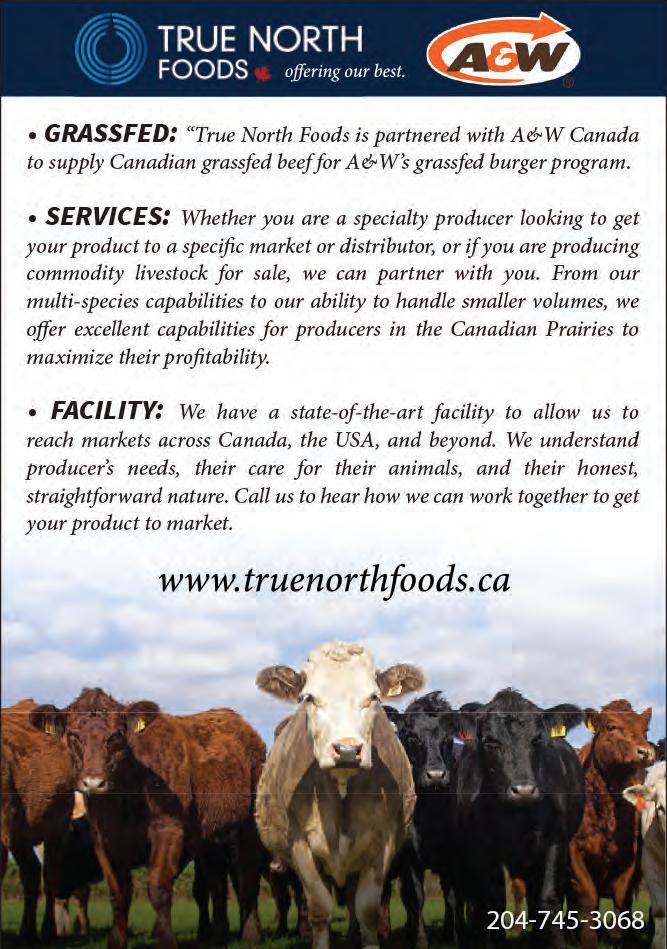
safety while reducing trade barriers and improving the movement of food products across Canada without putting our access to export markets at risk.
Animal disease preparedness and response
FPT governments, industry and sector partners continue to work collaboratively to advance preparedness measures to safeguard against animal and plant threats. This work continues through integrated prevention, surveillance, and response activities on avian influenza, African swine fever, Bovine Spongiform Encephalopathy, Bovine Tuberculosis, and aquatic diseases, among others.
Canada Launches Greener Homes Affordability Program to Cut Energy Bills and Emissions
(September 12, 2025 Natural Resources Canada News Release) Canada is taking action to build a clean, affordable future one home and building at a time. Buildings are Canada’s third-largest source of greenhouse gas emissions, and the way we heat, cool and power them is critical to tackling climate change. The Government of Canada is stepping up with practical, affordable solutions that deliver real results for Canadians.
That’s why we are launching the Canada Greener Homes Affordability Program (CGHAP) a new initiative that will help low- to median-income households reduce their energy bills and greenhouse gas emissions through no-cost home retrofits.
Today, the Honourable Tim Hodgson, Minister of Energy and Natural Resources, announced that the first CGHAP agreement has been reached with Manitoba. The federal government will provide nearly $30 million to support Efficiency Manitoba for the program.
CGHAP will be delivered in partnership with provinces and territories to ensure the program meets the distinct needs of communities across Canada. For the first time, this program will be available to tenants. Using a direct-installation model, CGHAP participants will not have to pay out of pocket for upgrades to their homes. Retrofits may include insulation, air sealing, heat pumps, solar panels, windows and doors.
CGHAP will also provide resources to Indigenous governments and representative Indigenous organizations through existing agreements administered by Indigenous Services Canada and Crown-Indigenous Relations and Northern Affairs Canada. Employing a distinctions-based approach with streamlined administrative requirements, CGHAP will work with First Nations, Inuit and Métis partners to advance their self-determined priorities in home energy efficiency.
CGHAP is a complementary program to the Oil to Heat Pump Affordability (OHPA) program that is
already available to low- to median-income Manitoba households that are ready to make the switch from oil heating to an eligible heat pump system. With OHPA, Manitobans can receive an upfront payment of up to $20,000 to help pay for the switch. Eligible Manitobans can now apply for funding from both the OHPA program and CGHAP, making energy efficiency improvements to homes across the province more accessible and affordable.
By transforming how we heat, cool and power our buildings, we’re not only tackling emissions, we’re also reducing Canadians’ bills and creating a blueprint for long-term economic prosperity.
Quotes
“Too many Canadians are struggling with the high cost of heating and cooling their homes. The Canada Greener Homes Affordability Program is about making life more affordable while tackling climate change. By helping Canadians retrofit their homes at no cost, we’re lowering energy bills, cutting emissions and improving comfort especially for those who need it most.”
The Honourable Tim Hodgson Minister of Energy and Natural Resources
“By helping families reduce their energy bills, we’re not only supporting affordability we’re also building a cleaner, more resilient future for everyone. These investments made in home retrofits through the Canada Greener Homes Affordability Program will also help support a stronger Canadian green buildings economy.”
The Honourable Julie Dabrusin Minister of Environment and Climate Change
“Manitoba is proud to lead as the first province to launch the Canada Greener Homes Affordability Program. This initiative builds on our strong foundation of energy efficiency excellence through Efficiency Manitoba and provides even more support to Manitobans as they work with trusted delivery partners making home retrofits more accessible, equitable and impactful. We are
Canada Launches Greener Homes Affordability Program to Cut Energy Bills and Emissions
continuously working to create a cleaner, more affordable energy future for all Manitobans.”
The Honourable Mike Moyes Manitoba Environment and Climate Change Minister
“Efficiency Manitoba is committed to helping Manitobans save energy, lower their energy bills and make their homes more resilient through energy efficiency. This additional funding allows us to bolster our efforts to meet Manitobans where they are, enhance our energy efficiency offers and make it easier for more Manitobans to benefit from our programs.”
Colleen Kuruluk CEO, Efficiency Manitoba
Quick facts
• Efficiency Manitoba is Manitoba’s Crown corporation dedicated to energy efficiency. With legislated long-term energy savings targets to achieve, the organization has a diverse suite of accessible offers available to help Manitobans save energy, money and the environment.
• Efficiency Manitoba will use CGHAP funding to build on the success of two existing low-
to median-income programs, the Energy Efficiency Assistance Program and the Métis Energy Efficiency Offers and will now cover the full income-based loan portion for ground-source heat pumps, reducing it to $0 for eligible homeowners.
• Manitobans can apply directly through the Efficiency Manitoba website and learn more about eligibility.
• Efficiency Manitoba also offers many costeffective programs and services to help all Manitobans save energy, lower their bills and improve home comfort.
• Homeowners and tenants who pay their energy bills can benefit from CGHAP retrofits expanding access to more lowto median-income Canadians.
Associated links
• Canada Greener Homes Affordability Program
• Oil to Heat Pump Affordability program
• Canada Greener Homes Initiative
• Canada Green Buildings Strategy
• Efficiency Manitoba
Farm Product Price Index, June 2025
(Source: September 8, 2025 edition of Statistics Canada’s The Daily)
The Farm Product Price Index rose 3.7% in June 2025 compared with the same month one year earlier, as gains in the total livestock and animal products index outweighed the loss in the total crops index. This marked its eighth consecutive monthly increase.
Higher prices for cattle, calves and hogs contribute to increase in the total livestock index
The total livestock and animal products index was up 11.3% in June compared with the same month a year earlier. The increase was primarily due to the increases in the cattle and calves index and the hogs index.
The cattle and calves index rose 20.0% in June 2025 compared with June 2024. The strong global demand for beef and veal contributed to the price gains for cattle and calves. Year over year, the exports of beef and veal increased by 12.7% in terms of quantity and by 22.6% in value in June 2025.
The hogs index increased 11.5% in June 2025 compared with the same month a year earlier. The lower inventory of hogs and strong demand for pork supported the price for hogs.
Gains in indexes of poultry (+1.8%), eggs (+0.2%) and dairy (+0.2%) also contributed to the increase of total livestock and animal products index.
Lower prices for major grains and specialty crops drive the decline in crops index
The total crops index dropped 2.7% in June compared with the same month a year earlier, marking the third consecutive year-over-year decline for the month of June. The decrease in the crops index was driven by lower prices for most major grains and specialty crops.
The grains index (-5.3%) recorded a third consecutive year-over-year decrease in June as prices for most grains were weaker compared with June 2024, with rye (-30.1%) and durum (11.2%) leading the price declines.
On a year-over-year basis, the specialty crops index fell 14.2% in June 2025, mainly as a result of lower prices for chickpeas (-31.1%) and dry peas (-17.4%). Tariffs imposed by China on Canadian peas in the first quarter continued to put downward pressure on the price of dry peas.
In June, the oilseeds index rose 1.1% compared with the same month one year earlier, marking the first month of year-over-year increase since January 2023. Stronger prices for flaxseed (+25.1%) and canola (+3.4%) supported the oilseeds index increase in June 2025, while lower soybean (-12.7%) prices softened the upward movement.
In June, the fresh potatoes index fell 1.2% compared with the same month one year earlier, breaking the eight-year trend of yearover-year increases for the month of June. Improved supply and reduced export demand in the second quarter of 2025 put downward pressure on potato prices.
Gains in the fresh vegetables (+3.3%) and fresh fruits (+0.6%) indexes moderated the decline in the total crops index.
Special Intake for Cost-Shared Funding for Livestock Water Supply
The Manitoba government has opened a special intake for livestock water supply development. The high-level program details that follow are from the Manitoba Agriculture website.
For full details, including a link to the application form, see: https://www.gov.mb.ca/scap/climatechange/sustai nableagr/livestock-water-supply.html
The “Frequently Asked Questions” document about the program is also provided in this edition of the enewsletter.
BMP 4700: 2025
• Own land where the project will be executed or have permission from the landowner to execute the project.
• Have a Manitoba Premises Identification number.
• Have a valid Statement of Completion for an Environmental Farm Plan at time of project claim.
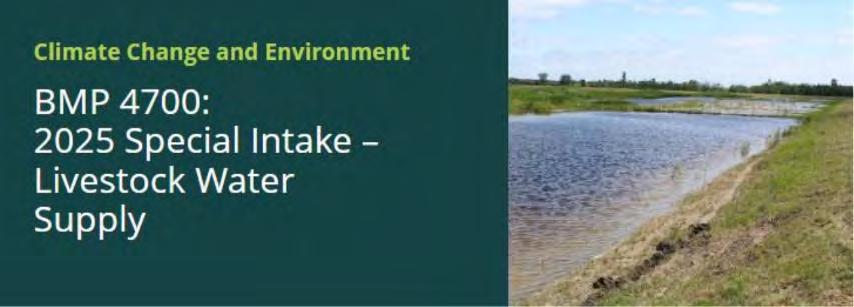
Special Intake – Livestock Water Supply
Applications will be accepted on a first-come, firstserved basis until available funding is allocated. Program guidelines are new for this intake. Please review carefully to ensure eligibility before applying.
The 2025 Special Intake: Livestock Water Supply intake supports livestock producers in accessing new or expanding existing water supplies during prolonged periods of dry conditions.
Intake Information
The intake for this program is currently open; funding requests will be accepted on a first-come, first-served basis from August 21, 2025, until available funding has been allocated.
Eligible Applicants
This intake is exclusively for livestock producers in specific areas impacted by dry conditions. To be eligible, livestock producers must:
• Manage agricultural land used to produce agricultural products. Hobby farms are not eligible.
The land location(s) for the project must be within a Municipality, Northern Affairs Community or First Nation within a Designated Region as identified by AAFC's 2025 Livestock Tax Deferral Provision. A list of Designated Regions is available on AAFC's website. If you are unsure of your eligibility, please contact us at agriculture@gov.mb.ca or 1-800-8114411.
Beneficial Management Practice (BMP) Summary Establish new or expand existing water supply for agricultural use by installing infrastructure.
• Wells: drilling new or deepening/extending existing, plus test hole drilling, screening, casing, well caps, etc.
• Dugouts: constructing new or rehabilitating existing dugouts.
• Associated components and actions: purchase and installation of pipe, plumbing and electrical, trenching, earthworks, etc.
• Permanent pipeline development: pipelines below the frost line OR shallow/above ground pipelines (pipelines above the frost line) that can be winterized, pipe, plumbing materials, trenching, earthworks, etc.
Eligible Expenses
The following type of expenses are eligible for funding:
• Incremental Personal Labour
• Incremental Personal Equipment Use
• Subcontracted Services
Special Intake for Cost-Shared Funding for Livestock Water Supply
• Professional Fees
• Capital Assets and Equipment
• Equipment Rental
• Materials and Supplies
Review the Program Guide for complete details on eligible and ineligible expenses.
Project Timeline
• All projects shall start April 1, 2025, or later.
• Project activities and all reports must be completed by December 12, 2025.
Cost Share Funding
• BMP 4700 has a cost share ratio of 50 per cent government, 50 per cent applicant, and a BMP funding cap of $15,000 per applicant.
• Producers that were previously approved for Sustainable Agriculture Manitoba - BMP 4700 are eligible for up to an additional $15,000 under the 2025 Special IntakeLivestock Water Supply for new projects.
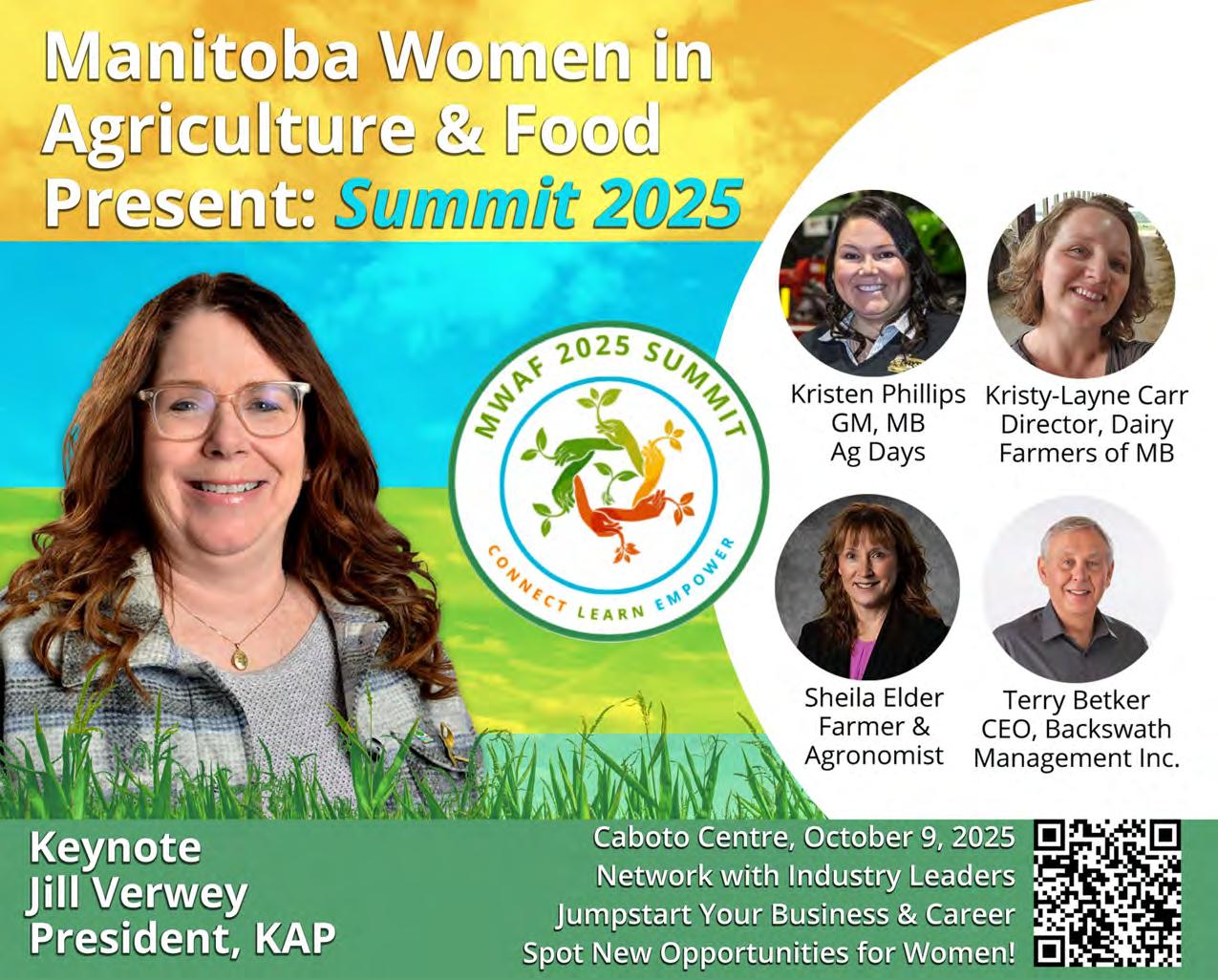

Sustainable Agriculture Manitoba Program BMP 4700:
2025 Special Intake
–
Livestock Water Supply
Frequently Asked Questions
Q. Who is eligible?
A. This intake is for livestock producers experiencing water supply shortages caused by dry conditions in specific eligible areas across agri-Manitoba.
The land location(s) for the project must be within a Municipality, Northern Affairs Community or First Nation within a Designated Region as identified by AAFC’s 2025 Livestock Tax Deferral Provision. A list of Designated Regions is available on AAFC’s website.
If you are unsure of your eligibility, contact us at agriculture@gov.mb.ca or 1-800-811-4411.
Q. How do I apply?
A: Application forms and program details can be found on the Special Intake webpage at BMP 4700: 2025 Special Intake. Applications are accepted on a first come, first serve basis, reviewed weekly and subject to the eligibility of submitted expenses and available funding. For eligibility criteria, refer to the BMP 4700: 2025 Special Intake – Livestock Water Supply Program Guide
Q. What is the cost share and cap?
BMP 4700: 2025 Special Intake – Livestock Water Supply has a cost share ratio of 50 per cent government, 50 per cent applicant, and a BMP funding cap of $15,000 per applicant.
Q. Can I apply more than once?
Eligible applicants may submit one (1) application for this intake, which may include multiple locations or projects within the same application. Regardless of the number of locations included in an application, the total funding cap will remain at $15,000.
Q. If I have already completed a water supply project, am I eligible?
A: Any projects for water supply occurring after April 1, 2025, are eligible. Producers that were previously approved for Sustainable Agriculture Manitoba BMP 4700 Water Supply are eligible for up to an additional $15,000 under the 2025 Special Intake – Livestock Water Supply for new projects
Q. When do I have to complete my project by?
A: Projects must be completed and claims submitted by December 12, 2025.
Q. Do I need a valid Environmental Farm Plan Statement of Completion?
A: You may submit an application without a valid Statement of Completion; however, you will be required to have one when you submit the claim to be reimbursed. To complete your Environmental Farm Plan, please visit https://online.manitobaefp.ca/


Q. Are confined livestock operations eligible?
A: Yes. All livestock operations in need of water are eligible to apply provided they are located within the eligible areas.
Q. Do I have to dig a dugout to a specific size?

A: All dugout work, including new construction or rehabilitation of an existing location, should follow the Dugout Construction Guidelines. See Appendix A below.
Q. Can I drill a new well in my yard?
A: Drilling a well in a farmyard is eligible if it will be used for watering livestock and is the most cost-efficient means of doing so.
Q. Do I need any permits?
A: Applicants must meet all regulatory requirements. This may include:
- a water rights license from Environment and Climate Change, which is required for all livestock operations extracting more than 25,000 litres (25m3 or 5,499 Imperial gallons) per day. If developing a new water source, a permit must be obtained in advance of work beginning.
- approvals from the rural municipality or Crown.
- any other standards or approvals as required by law.
- For details on regulatory requirements, please visit: Licensing, Regulation and Policy, Manitoba government Groundwater and Wells, Manitoba government Drainage & Water Control, Manitoba government
Q. Can I pipe water from an existing water source into a dugout that has run dry?
A: No. Piping or hauling from a water source (well, dugout or wetland) into a dugout that has run dry is not eligible. However, piping from a water source to an alternate watering system is eligible.
Q. How deep does the pipeline need to be?
A: Shallow or above-ground pipelines (including those above the frost line) that cannot be winterized are ineligible. Projects must be for permanent solutions only. Summer pasture pipelines permanently installed underground and those which are able to be winterized before freezing, are eligible.
Q. Can I apply for a project on a pasture that I rent?
A: Yes. Either the landowner or renter can apply. If the renter applies, they must identify the landowner and provide contact information as part of the project description. This includes pasture on Crown Land.
Q. If I have more questions, who can I contact?
A: Livestock producers can call the toll-free line 1-800-811-4411 or send an email to Sustainable CAP - Program Administration at agriculture@gov.mb.ca
Other related information
- Dugout Construction Guideline – see Appendix A below
- Program Guide
- Program Webpage
- Eligible Designated Regions - AAFC 2025 Livestock Tax Deferral Provision
- Licensing, Regulation and Policy, Manitoba government
- Groundwater and Wells, Manitoba government
- Drainage & Water Control, Manitoba government

Appendix A
Livestock Dugout Construction Guidelines
- Exclusion fencing is recommended but not required:

• Exclusion fencing ensures that livestock are restricted from direct access to the dugout, protecting against manure contaminated runoff and drowning.
• Exclusion fencing should be a minimum of 15m (50’) from the edge of the dugout.
- Dugout location:
• The dugout should be far enough away from any stream, river or creek as to not compromise bank stability or impact the riparian area.
- Dugout construction:
• End slopes and side slopes should be no steeper than 1.5:1.
• Dugout edge should be stabilized (by excavator) during construction.
- Dugout sizing:
• In order to build resilience into your farm, dugouts should be sized for drought proof standards by accounting for more than one season’s worth of water.
• Dimensions can be calculated using this Dugout Volume Calculator
- Alternate water system components:
• Troughs / tanks should supply a minimum of one day’s water usage based on 15 imp gal/ head/day
Dealing with Dry Conditions: Livestock Hay and Feed Options
Crown Lands Options to Assist with Feed Shortages
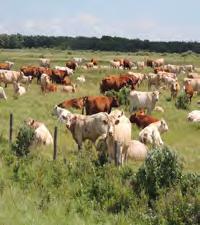
Producers facing feed shortages due to poor hay production are encouraged to explore all available options including assessing the economic viability of harvesting hay on marginal Crown land. With calf prices at record highs, optimizing feeding strategies is essential to avoid sacrificing valuable weight gain.
Wildlife Management Areas (WMAs)
WMAs and wildlife-coded parcels are currently available for casual haying and grazing permits, based on habitat management plans. Each year, agriculture and wildlife teams work together to align these permits with ecological objectives, ensuring responsible use of the land.
As of July 31, 2025, some WMA parcels remain available for casual permit.
WMAs are one tool in our broader response to feed shortages. While not a complete solution, they can provide valuable support to some producers during challenging conditions.
Agricultural Crown Lands (ACL)
Standard Agricultural Crown Land parcels are available for casual permit.
ACL permits are managed to support agricultural use while maintaining land health and productivity. Casual use of ACL parcels is facilitated through a permit system that allows short-term access for haying and grazing, providing flexibility for producers responding to feed shortages.
Interested producers can:
1) Refer to Manitoba’s Wildlife Management Area Map to locate WMAs.
2) Contact the local Agricultural Crown Lands Farm Production Extension Specialists for available parcels.

Resources
Managing Dry Conditions and Drought information on managing crops and livestock, farm management calculators, financial assistance programs, monitoring and seasonal reports and mental health and wellness resources.
Hay Listing information on hay for sale and to list hay available for purchase
Livestock Webpage information on what’s new, resources and upcoming events.
Manitoba Agricultural Services Corporation (MASC) information on insurance and program assistance. Contact your MB Agriculture / MASC Service Centre for program details, including recently announced support measures to aid Manitoba’s livestock producers affected by drought conditions.
Seasonal Reports seasonal updates that pertain to crop and forage production.
Weather Conditions and Reports year round data from over 100 weather stations across agro-Manitoba that monitor air temperature, relative humidity, barometric pressure, precipitation, wind speed and direction, solar radiation, soil temperature, and soil moisture.
Contact Us
For more information, contact the department: Online: www.manitoba.ca/agriculture
Email: agriculture@gov.mb.ca
Phone: 1-844-769-6224
Feed testing resources
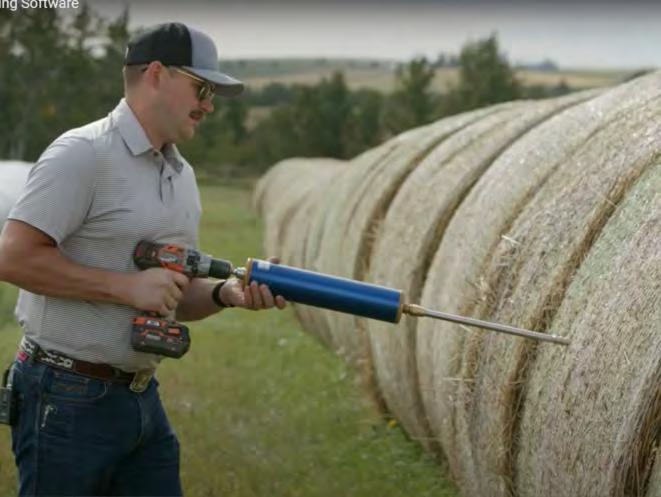
You cannot manage what you don’t measure. Feed testing is critically important to ensure your herd’s nutritional requirements are being met to support production. Feed testing and ration balancing also helps prevent costly overfeeding. Check out this resource from the Beef Cattle Research Council:
https://www.beefresearch.ca/blog/feed-testinga-tool-for-better-returns/
When faced with reduced supplies of good quality hay due drought, many producers seek alternative feeds for their livestock. While these alternative feed sources can offer flexibility, feed testing and advice from a livestock nutritionist is recommended to ensure nutritional requirements of the type of cattle being fed are met. Check out the following resource from the Beef Cattle Research Council for considerations when using alternative feeds:
https://www.beefresearch.ca/topics/alternative -feeds/
Alternative or non-conventional feeds can be an economical means for beef cattle producers to supplement forage and grain inventories.
However, due to variability in the supply, nutrient composition and quality of these feed ingredients, there can be pitfalls if not properly managed. Have a listen to this episode of the Canadian Beef Cattle Podcast for tips on making use of different alternative feeds:
https://open.spotify.com/episode/0hsfECxYMsb 0ta0JHwon67?go=1&sp_cid=a2b2ebaa1e65940f def68f683c932de9&utm_source=embed_player _p&utm_medium=desktop&nd=1&dlsi=adc2a2 537f324cf6
New to feed testing and ration balancing? Feed testing and ration balancing are good practice normally but are even more important in times of feed shortages and when making use of alternative feed sources. The following link is your one stop shop for information and instructions on feed testing including how to take and submit a sample, and how to interpret the results:
https://www.beefresearch.ca/tools/feedtesting-analysis-for-beef-cattle/
When considering salvaging crops for feed, beef producers need to consider accessibility, availability, yield, transport costs, potential antinutritional factors or other animal health impacts, and feed quality. The value of crops for livestock feeds calculator was developed to help beef producers work with their neighbors to determine a value for salvaged crops.
https://view.officeapps.live.com/op/view.aspx?s rc=https%3A%2F%2Fwww.beefresearch.ca%2Fc ontent%2Fuploads%2F2022%2F04%2FValue_of _Crop_for_Feed_locked.xlsx&wdOrigin=BROWS ELINK

Livestock & Forage Extension Specialist
G3Agrologist 3
Regular/full-time
Department ofAgriculture
Science, Innovation and Extension,Agriculture Production, Innovation and Resilience
Arborg MB, Killarney MB
Advertisement Number: 44506
Salary(s): G3 $77,071.00 - $102,261.00 per year
Closing Date: October 5, 2025

The Manitoba government recognizes the importance of building an exemplary public service reflective of the citizens it serves, where diverse abilities, backgrounds, cultures, identities, languages and perspectives drives a high standard of service and innovation. The Manitoba government supports equitable employment practices and promotes representation of designated groups (women, Indigenous people, persons with disabilities, visible minorities).
Employment Equity is a factor in selection for this competition. Consideration will be given to Indigenous people and persons with disabilities.
Candidates who do not meet all essential criteria may be considered on an underfill basis at a commensurate rate of pay
An eligibility list may be created to fill similar Livestock & Forage Extension Specialist positions across the province and will remain in effect for 12 months.
To be considered for this competition, candidates must submit both a resume and cover letter (Word or PDF format only).
Introduction
The Department ofAgriculture is seeking to fill two G3 positions for Livestock & Forage Extension Specialists.These roles are primarily based in Killarney andArborg; however, they may be located in any ManitobaAgriculture office in the region, subject to operational requirements and approval.
Conditions of Employment:
Must be legally entitled to work in Canada
Must be a member of, or eligible for membership in the Manitoba Institute ofAgrologists at the ProfessionalAgrologist level (P.Ag).
Must possess and maintain a valid full-stage Manitoba Class 5 driver's licence.
Must be comfortable with the use of vehicles and all terrain vehicles in rough terrain and isolated areas.
Must be able to perform work in the field, including occasional overtime.
Must be able working outdoors, under inclement weather and limited communication service.
Qualifications:
Essential:
Bachelor of Science inAgriculture with an emphasis in animal science or forage management.An equivalent combination of education and experience may be considered.
Demonstrated experience in ruminant livestock production and forage production, including environmentally sustainable practices, specific to production practices on the Canadian Prairies.
Knowledge of ruminant livestock and forage production practices on the Canadian prairies.
Excellent verbal communication skills with the ability to effectively prepare and deliver training presentations and training events.
Excellent written communication skills.
Ability to independently manage projects and undertake necessary research and information gathering to keep current on issues/trends in the industry.
Excellent interpersonal skills with the ability to work effectively and collaboratively in a multidisciplinary team with internal and external stakeholders.
Strong problem solving skills.
Strong organizational and time management skills with the ability to manage competing deadlines.
Duties:
Livestock & Forage Extension Specialist delivers extension and regional programs and projects related to productivity, profitability, and sustainability for livestock, forage, and rangeland production. The Livestock & Forage Specialist provides management advice in these areas to primary producers; and supports applied livestock and forage demonstration and research trials.
Apply Now: Advertisement # 44506
TalentAcquisition
Human Resource Services
600-259 PortageAvenue
Winnipeg, MB, R3B 2A9
Phone: 204-945-7518
Fax: 204-945-0601
Email: govjobs@gov.mb.ca
WHEN APPLYING TO THIS POSITION, PLEASE INDICATE THE ADVERTISEMENT NUMBER AND POSITION TITLE IN THE SUBJECT LINE AND/OR BODY OF YOUR EMAIL.
Applicants may request reasonable accommodation related to the materials or activities used throughout the selection process. When applying to this position, please indicate the advertisement number and position title in the subject line and/or body of your email.Your cover letter, resumé and/or application must clearly indicate how you meet the qualifications.
Please be advised that job competitions for represented positions may be grieved by internal represented applicants. Should a selection grievance be filed, information from the competition file will be provided to the grievor's representative. Personal information irrelevant to the grievance and other information protected under legislation will be redacted.
We thank all who apply and advise that only those selected for further consideration will be contacted.

